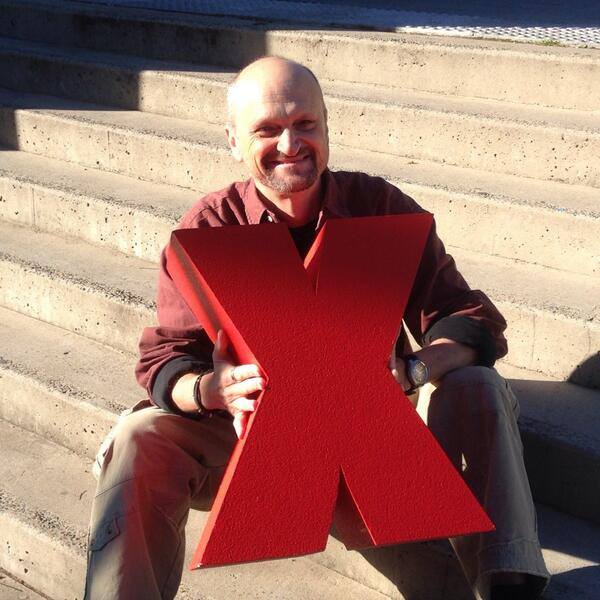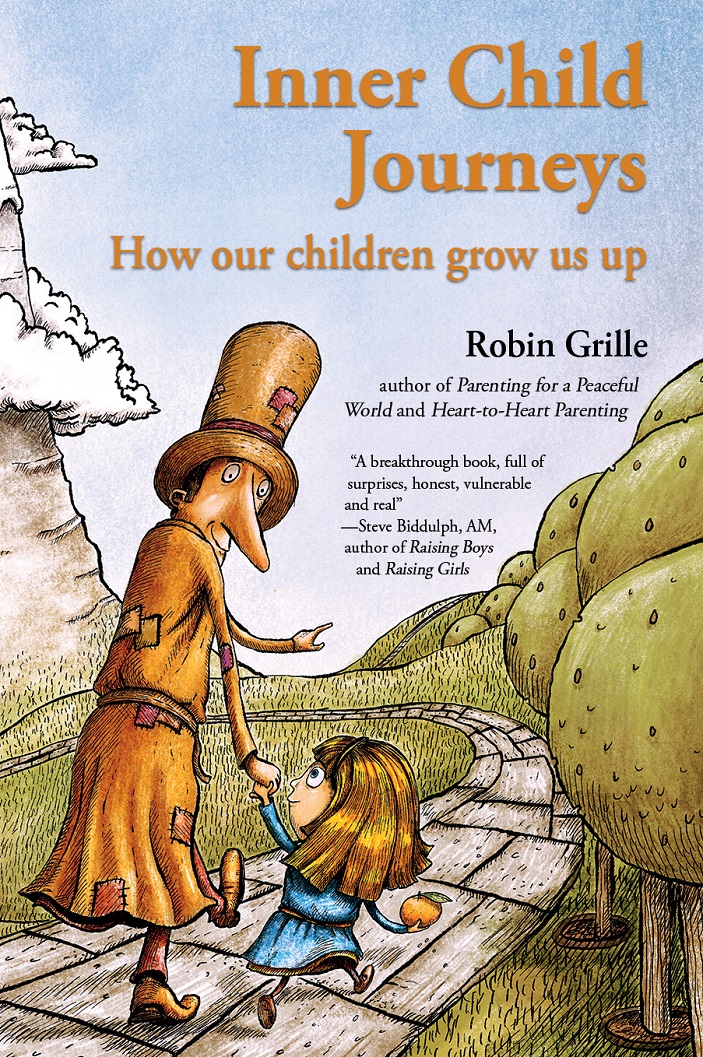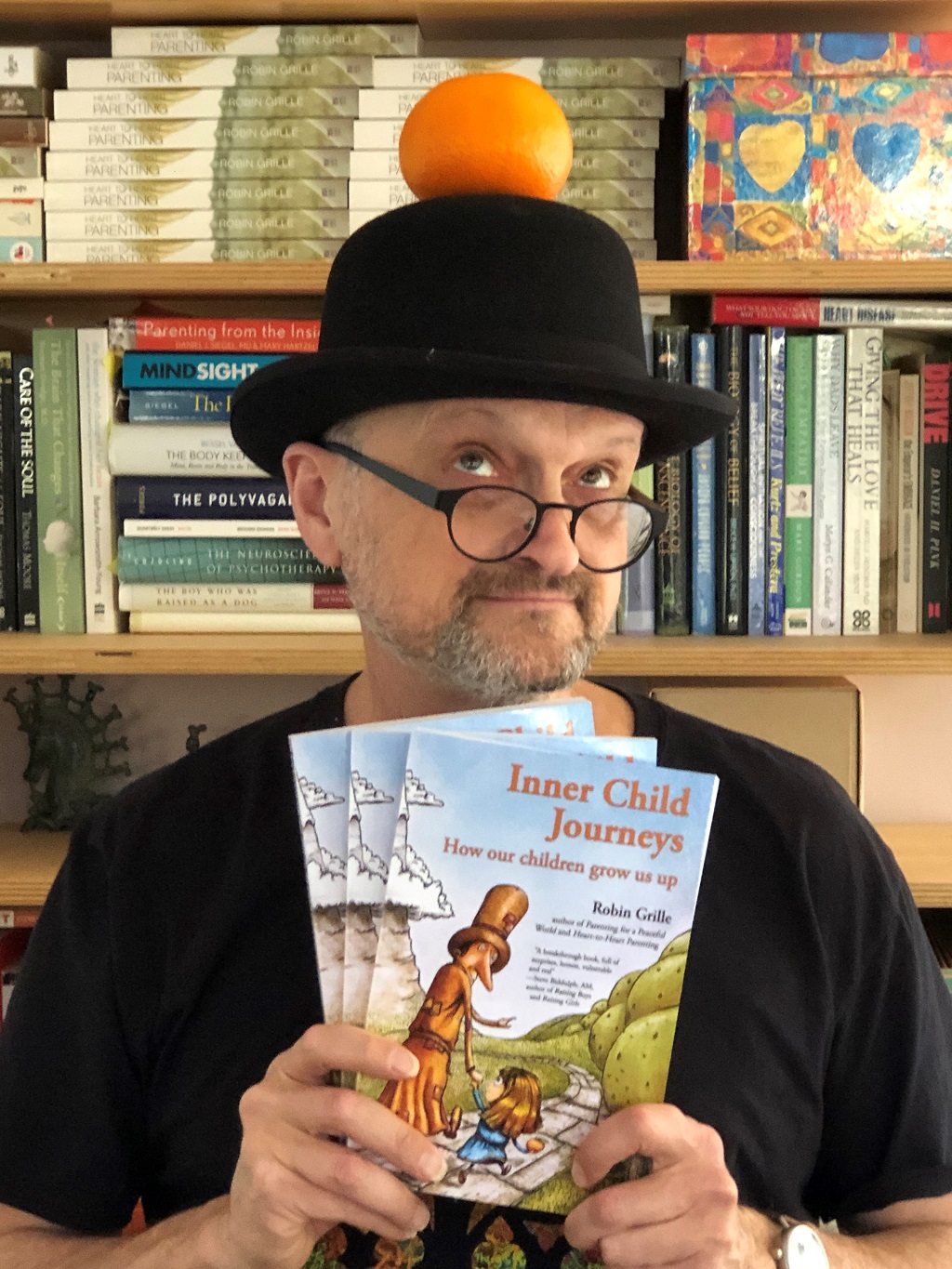December 1 - 7, 2019: Issue 431
Robin Grille
Robin is a psychologist in private practice and a parenting educator. He is the author of many brilliant articles along with the internationally acclaimed books ‘Parenting for a Peaceful World’ and ‘Heart to Heart Parenting’. He has recently launched a new work, Inner Child Journeys: How our Children Grow us up - and shares an excerpt this Issue.
Robin has delivered his seminars and workshops around Australia, New Zealand, USA, UK, Canada and Indonesia. His experiential, skills-based and informational parenting courses have helped many people to embrace parenting as a transformative, personal growth journey. Robin also runs workshops about behavioural boundaries, empathy, motivation and vocation for teachers in early childhood through to high school.
Drawing from 30 years’ clinical experience and from leading-edge neuropsychological research, Robin’s seminars and courses focus on healthy emotional development for children; while building supportive, co-operative parenting and education communities. Robin’s work is animated by his belief that humanity’s future is largely dependent on the way we collectively relate to our children.
This week an insight into one of our local 'gifts' in a person.

Robin was one of the Speakers at the TED X event at Pittwater in 2014
Robin Grille – BA (psych), Grad Dip Counselling, Dip Int Psych, MAPS
Visit: www.robingrille.com
Blog: hearttoheartparenting.org
My Story
I generally introduce myself as a psychologist, parent-educator and author – because that’s the ‘business-card’ approach. However, that’s not quite the whole story.
I was born in Uruguay to migrant parents. Spanish was my first language, French my second (from attending a French Lycée) and Romanian my third (from my parents). When I was 10 years old we left a troubled South America behind, and came to Sydney, Australia, where I have lived ever since. Although this early dislocation was quite challenging, it has left me with a lifetime fascination with how our diverse cultures and our childhood experiences shape the way we relate to the world.
After university, I spent many years training in a number of psychotherapy modalities; in particular: group therapy and body-oriented psychotherapy. Psychotherapy continues to be a commitment and passion for me. I’ve been in private practice as a psychotherapist, relationship counsellor and parent coach for 30 years. Besides this: playing music (guitar, singing and percussion) is my second vocational passion – and I strongly believe in the healing properties of music.
And now…
My wife Linda and I are entering a new life-phase of re-invigoration and creativity, as our beloved 20-year-old daughter sets forth on her global voyages of self-definition, adventure and overseas study. Fatherhood has been the heart-centre of my life, and the most life-changing and humbling of all my learning experiences.
I love to research and to write about all the sciences and knowledge systems that clarify what it is to be human and illuminate our quest for our truest potential. I have written many articles for parents and for professionals who work with children; and they have been translated into multiple languages and republished around the world. Additionally I have written two books: Parenting for a Peaceful World and Heart to Heart Parenting, and so far they’ve been translated into German, Korean and Chinese – with more translations on their way. My newest book is now out - more below on this.
I travel around Australia and the world delivering keynote addresses, seminars and workshops. That’s because one of my favourite things is to meet the international communities of wonderful people who are devoted to enriching children’s lives and empowering them to flourish.
How to find me…
If you would like to find out more about my counselling sessions, or how to engage me to speak at your school, workplace, festival or conference, please contact me and I will be glad to answer your questions.
Inner Child Journeys: How Our Children Grow Us Up
by Robin Grille (Author)
on Amazon - $18.00
Paperback: 338 pages
Publisher: Vox Cordis Press (October 8, 2019)
Language: English
A guide for parents and teachers to work with the powerful emotions that are triggered in them through their interactions with children. This handbook is based on leading-edge neuropsychological principles and research, as well as the author's 30 years of clinical experience. The Inner Child Process outlined in this book benefits the reader by turning even the most difficult challenges of parenting and teaching into profound personal healing and growth opportunities. Using this Process additionally assists the reader to access deeper intuitive understandings about the needs of the children they are raising or working with. Finally, there are instructions for using this Inner Child Process in a group setting, as a community-building exercise.
In simple layman's terms, 'Inner Child Journeys' explains a safe, step-by-step method for understanding the emotional reactions triggered in us by our children, at all ages. This Process was tested and refined over many years by Australian psychologist Robin Grille, and it is based on sound neuropsychological principles. In its 'light' or 'in-depth' forms, this Inner Child Process can help you gain new and profound insights about yourself and about your children, honing your own intuition about what your children need in order to thrive. It will help you understand even your children's most baffling behaviours - via a better understanding your own childhood experiences and how they've affected you. At the same time, this Process helps you to better understand your own, deepest emotional needs, and how to have those needs met.
Ultimately, Inner Child Journeys are about healing long-held emotional wounds that are often brought to the surface through our interactions with our children. Most of us encounter, from time to time, significant challenges and difficult terrain in the course of parenting or educating our children. This Inner Child Process helps you engage with even the most insurmountable challenges in your child-rearing endeavours, and turn those challenges into exciting and empowering personal-growth and healing opportunities for you. The book gives no advice about how to raise your children, nor how to educate your students. That's because this book helps you access your own inner knowledge, based on your own experiences as a child. The more you befriend your own Inner Child, the more emphatic and effective a parent or teacher you become. Your children benefit enormously as you grow. Written for parents, elders, schoolteachers and psychotherapists, this book shows you how to turn child-rearing into a most exciting and transformative personal growth and healing adventure. Indeed, 'our children grow us up'.
Reviews
'It's one of our greatest fears--that we might pass our hang-ups on to our kids. Robin, in his honest, meticulous way, shows how we can avoid this, how we can plunge into our own murky depths and find treasure, by releasing old hurts so we don't repeat them. A breakthrough book, full of surprises, honest, vulnerable and real.'
-- Steve Biddulph, AM, author, 10 Things Girls Need Most, Raising Girls, Raising Boys, The Complete Secrets of Happy Children, and The New Manhood
'As parents we either unconsciously parent exactly as we were parented or we consciously try to do the exact opposite. Either way our parenting is trapped by how we were parented, I can think of no more important and liberating work for parents to do than to take this Inner Child healing Journey with Robin Grille as their guide.'
-- Pam Leo, author, Connection Parenting
'What an insightful book. We couldn't put it down!'
-- Dominique Ben and Mim Dart, directors, MummyCon
'This book is gold! Robin's practical approach will leave you, and those you love, feeling like a fresh summer breeze has come through your life.'
-- Roger Harman, CEO, Corporate Heart International
'As a former relationship counsellor, I have found inner child work to be one of the most profound approaches to clients' wellbeing I know. As a mother, I found Inner Child Journeys made sense of the confusion, shame and helplessness that could sometimes rob me of the joy and wonder of parenthood. As a daughter, it helped me to understand and forgive my own parents for the neediness of their own Inner Child. There are very few books I would assert are essential reading for parents. This is one of them.'
-- Elly Taylor, Perinatal relationship expert, author and founder, Becoming Us, becomingusfamily.com

Excerpts From 'Inner Child Journeys - How Our Children Grow Us Up
My Vision and Dedication
Our Inner Child will not be left behind. He lives on in our memory, our reactions, our behaviour and our perceptions. She whispers about all we have lived and learned, in our mother’s womb, at birth, in the arms of our elders, at school. We would not want to lose access to this body of experience if we understood but a fraction of its gifts.
We have everything to gain from becoming better acquainted with this Inner Child, his wisdom, her vibrancy, his bottomless creativity and playfulness, her resilience. If we dare to learn from remembered pain, then this pain was not for naught.
But what I love the most about the Inner Child is how she connects us to each other, making us all family. This has been the shared story of us all, since the beginning. From child to adult to elder, and back again, often. It was true for our forebears, and will be true for our descendants. Joni Mitchell was right when she sang that our ‘painted ponies go up and down… on the carousel of time.
Through the eyes of a child, nothing is mundane; everything contains magic. A leaf. A shoelace. A stick. A beetle. Every moment is wondrous, filled with portent. Nothing is ordinary, everything brings awe and delight. I remember our daughter as a baby, how she’d wrap her chubby fingers around something, then drop it, watching it fall. She would do this over and over, and each time gravity had its way, she would belly laugh as if it was the first time all over again. When did we lose this capacity for wonder?
Watching our baby daughter playing nakedly on the pavers in our patio, she helped me to remember what I had become blind to: the essential magic in all things. She saw grandeur in the flow of water. She heard endless surprises in the call of a bird. She meditated on the march of an ant. She saw the miracle of each moment. Hers was an absolute absorption in each activity, a reverence for the extraordinariness in all ordinariness. How nourishing the world would seem, if we could see again, as we all once did. I had not anticipated that fatherhood would teach me so much. Our daughter helped me to rediscover my own capacity to be child-like. I have not lost this—not entirely, that is—and I can thank her for helping remind me about the magic that dwells in the mundane. More than enough beauty resides in the most ordinary moment; if we just remember how to see it.
This does not require any appeal to notions of a ‘supernatural’; as if the natural is not miraculous enough. This magic has more to do with our own internal state. The kind of undefended vision that is permeable to the miracle of all things and the magnificence of all beings is entirely re-discoverable, for those of us who have temporarily lost it. It is simply a matter of re-learning how to see, and re-learning how to hear. In the palm of his or her hand, our Inner Child holds the secret to this clarity of perception, and will share it freely when we have deeply listened to his feelings, her needs.
I dedicate this book to the re-magick-ing of our lives; to the human right to find pleasure in our work, to have harmony in our relationships and to be filled with wonder about the world we inhabit.
Creating the Inner-Child-Aware, Heart-Centred Society
When we remember the Inner Child perspective and weave it in to our conversations and daily endeavours we free others from our projections, we become more responsible for our emotions and perceptions and our hearts become more available for connection. Life decisions that are informed by self-knowledge and the voice of the heart are invariably much better decisions.
Imagine a world - or if that seems too ambitious for now, a culture - where a commitment to insight and intentional vulnerability is the norm. What would life be like in a world in which adults understood that the way we see our children is clouded by our past? What would it be like to live among adults who regularly screen their impulses and commit to their own growth alongside their children? Imagine a world whose inhabitants accept that growing up is mutual, that our children grow us up just as we grow them up. What kind of world would we create if social policies were informed with a sharp awareness of a child’s point-of-view?
Though outwardly we might speak with the voice of an adult, make declarations with a tone of authority and explain ourselves with erudition, so much of what we say and do comes directly from our Inner Child. How often we are babies in uniform, toddlers in three-piece suits, juveniles with credit cards and big plans. With our Inner Child’s needs and fears buried in the unconscious, we skilfully project a grown-up’s persona, convincing ourselves and most – but not all! – of those who surround us of our faux maturity. How adroitly we rationalise our Inner Child’s needs! We say we want justice when we hunger for revenge. We speak of loyalty when want to cling. We become directorial when we feel afraid. We boast when we feel ashamed. We control our children when we feel helpless. In fear of abandonment we make promises we cannot keep. For the approval of elders long departed, we accept drudgery at the workplace and relegate playtime to the weekend. What would our lives be like if we awakened to our Inner Child’s need, instead of making blind choices based on triggered body-flashbacks? How might our lives change with our Inner Child as our beloved passenger, instead of our haphazard driver?
Imagine our societal choices driven by a clear memory of how it feels to be a baby or child, rather than by intellectualizations, abstractions, economic formulas or commercial agendas. Would we still use industrial-scale childcare at a ratio of 5 babies per carer, if we actually remembered how it felt to be a baby? Would we still cynically convince healthy mothers to abandon breastfeeding in favour of artificial formulas for the pleasure of Big Business? Would we expect babies to ‘self-soothe’ and sleep alone? Would we still destroy natural childbirth in a hail of defensive and unwarranted obstetric interventions? Would we continue to deprive parents of appropriately paid maternity and paternity leave? Would we still allow children to be corporally punished if we truly remembered how this felt? Would we still lock kids in their rooms? Would we leave our youth alone to figure out the enigmas of sexuality and relationships if we remembered how scared and lonely we once felt? Would we let our young go through 12 years of school without being connected to their true vocational passions? Would we continue to treat full-time parents as second-rate citizens and school-teaching as a booby-prize profession?
If our modern societies are so disconnected and full of sadness, so exploitative and discordant with Nature, it is because we adults have by and large shut ourselves off from the child’s reality. Despite all the doting and the indulgence of their material needs, we minimise and downplay children’s emotional needs. This is the inevitable corollary of having denied our own Inner Child. Bring that Inner Child home, listen intently, and immediately we begin to connect to the world around us in a whole new way. If enough of us, a critical mass of people, become Inner-Child-aware, a beautiful socio-political fallout is assured. I believe that our recent, more psychologically awakened generations offer a great potential for paradigm shifting social transformation. Though it might seem hard to believe, given the daily screening of the world’s atrocities, statisticians assure us that globally, average rates violence – domestic, criminal, civil and international – have been in sharp decline for several decades now. But our woes are not over yet and we face a new crisis brought on by our pathological indifference to the ecological systems on which we depend. Dissociation and de-sensitisation can be as catastrophic for us as chronic violence. That still, small voice inside each of us wants our attention. If we listen and respond, we not only make our own lives better, we also make the world a better place for others, for our children and for our descendants.
